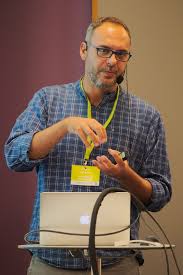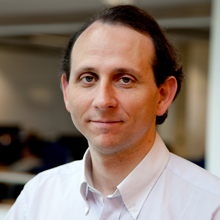Invited Speakers
|
Dr Eduard Vazquez , Research Technical Manager, AnyVision, UK
Bridging research in AI in academia and Industry
 It’s not exactly a secret that a dramatic change has occurred in the AI landscape. A change that has reinvented the relationship between academia and industry in the field, even drawing a question mark regarding the very same concept of AI. I’m going to explain my views on how the binomial academia-industry could work but also, and equally important, I will extend this relationship to a third concept, namely, real adoption of Computer Vision products in the real world. Research isn’t happening anymore just in the academia, but also in the industry. The borders between these two, previously well-separated worlds, are fading away. Industry is publishing papers in top conferences and academia is claiming benefits from the commercial applications. But such -whether good or bad- change cannot be understood without the incredible amount of investment that is being thrown into a plethora of new start-ups and, often times, questionable products.
It’s not exactly a secret that a dramatic change has occurred in the AI landscape. A change that has reinvented the relationship between academia and industry in the field, even drawing a question mark regarding the very same concept of AI. I’m going to explain my views on how the binomial academia-industry could work but also, and equally important, I will extend this relationship to a third concept, namely, real adoption of Computer Vision products in the real world. Research isn’t happening anymore just in the academia, but also in the industry. The borders between these two, previously well-separated worlds, are fading away. Industry is publishing papers in top conferences and academia is claiming benefits from the commercial applications. But such -whether good or bad- change cannot be understood without the incredible amount of investment that is being thrown into a plethora of new start-ups and, often times, questionable products.
Perhaps the two main questions are:
- Is there a real, direct relation between the initial research occurring in a university and a final product with commercial success, in such manner that academia should claim benefits?
- What is the effect that massive growth on investment is having in our field and the quality of future research and products?
In this talk, I’ll try to shed some light into these two critical questions.
Dr. Eduard Vazquez has been working on Computer Vision for the last 15 years. Former lecturer of Artificial Intelligence, he has 10 years’ experience on commercialising a variety of methods for medical imaging, retail, manufacturing, surveillance, health and safety and real-time video analytics. His main focus has been to understand the gap between theory and the real world in order to help delivering products that can be effectively adopted. He’s Research Technical Manager at Anyvision, where he works on face recognition for multiple use cases and industries and in-store analytics for retail, from cloud to edge.
Dr. Antonios Michalas, Department of Computing Sciences, Tampere University of Technology, Finland
Fake News Outbreak 2020: Can we Stop the Virus Spreading?
 Computer viruses have come a long way from the early days of personal computers when amateur hackers were designing simple software that could harm the proper functionality of a single machine. Nowadays, computer viruses have become more sophisticated and are able of exercising severe impacts aimed not only on large computer networks but social sphere of life as well (e.g. NHS WannaCry Attack). However, all viruses are driven by the very same principle: Self-replicating programs designed to spread itself from computer to computer. Nowadays, and with the intense use and spread of social media, many Internet users are facing the same challenge: Deciding whether to believe something on the Internet or not. Misinformation behaves like a virus. Fake news and false rumors reach more people, penetrate deeper into the social network, and can spread as fast as accurate stories. Even though misinformation, spin, lies and deceit have been around forever, in the past years it was easier to identify them since we were mainly reading news trough trusted and evaluated sources. However, making judgments about what to trust on the web can be really challenging. In this talk we will present a high-level overview of the problem of spreading fake news and its possible impact and will describe the base that needs to be built to successfully provide mechanisms that will reduce the spread of fake information.
Computer viruses have come a long way from the early days of personal computers when amateur hackers were designing simple software that could harm the proper functionality of a single machine. Nowadays, computer viruses have become more sophisticated and are able of exercising severe impacts aimed not only on large computer networks but social sphere of life as well (e.g. NHS WannaCry Attack). However, all viruses are driven by the very same principle: Self-replicating programs designed to spread itself from computer to computer. Nowadays, and with the intense use and spread of social media, many Internet users are facing the same challenge: Deciding whether to believe something on the Internet or not. Misinformation behaves like a virus. Fake news and false rumors reach more people, penetrate deeper into the social network, and can spread as fast as accurate stories. Even though misinformation, spin, lies and deceit have been around forever, in the past years it was easier to identify them since we were mainly reading news trough trusted and evaluated sources. However, making judgments about what to trust on the web can be really challenging. In this talk we will present a high-level overview of the problem of spreading fake news and its possible impact and will describe the base that needs to be built to successfully provide mechanisms that will reduce the spread of fake information.
Prof. Antonis Michalas received his PhD in Network Security from Aalborg University, Denmark and he is currently working as an Assistant Professor at the Department of Computing Sciences, at Tampere University, Finland. At Tampere University, Antonis is co-leading the Network and Information Security Group with Prof. Billy Bob Brumley. The group comprises PhD students, professors and researchers. Group members conduct research in areas spanning from the theoretical foundations of cryptography to the design and implementation of leading edge efficient and secure communication protocols. Apart from his research work at the Network and Information Security Group, as an assistant professor he is actively involved in the teaching activities of the University. Finally, his role expands to student supervision and research projects coordination. Furthermore, Antonis has published a significant number of papers in field-related journals and conferences and has participated as a speaker in various conferences and workshops. His research interests include private and secure e-voting systems, reputation systems, privacy in decentralized environments, cloud computing, trusted computing and privacy preserving protocols in eHealth and participatory sensing applications.
Dr Ansgar Koene University of Nottingham, UK.
Ethics Standards for Autonomous and Intelligent Systems – building the foundation for trust
 Automated image analysis has great potential for a wide range of policing and crime prevention applications ranging from the use of face recognition technology to rapidly scan for criminal suspects in CCTV footage, to real-time detection of violent behaviour patterns, analysis of satellite images for patterns associated with modern-day slavery and many more. The use of these technologies however requires high levels of public trust in the ethical oversight processes involved in their development and operation. As shown by the recent wave of legal challenges to the use of face recognition technology, this public trust cannot be taken for granted. One route towards establishing trust is through the use of standardized ethics-based development processes that provide clear evidence suitable for third-party verification. In this talk I will introduce the IEEE P70xx series of ethics-based Standards for Autonomous and Intelligent Systems, with an in-depth review of the IEEE P7003 Standard for Algorithmic Bias Considerations. By walking through a hypothetical example of using the IEEE P7003 Standard during development of a automated face recognition system it will be shown how the use of this Standard can contribute to providing a foundation for public trust in Autonomous and Intelligent Systems.
Automated image analysis has great potential for a wide range of policing and crime prevention applications ranging from the use of face recognition technology to rapidly scan for criminal suspects in CCTV footage, to real-time detection of violent behaviour patterns, analysis of satellite images for patterns associated with modern-day slavery and many more. The use of these technologies however requires high levels of public trust in the ethical oversight processes involved in their development and operation. As shown by the recent wave of legal challenges to the use of face recognition technology, this public trust cannot be taken for granted. One route towards establishing trust is through the use of standardized ethics-based development processes that provide clear evidence suitable for third-party verification. In this talk I will introduce the IEEE P70xx series of ethics-based Standards for Autonomous and Intelligent Systems, with an in-depth review of the IEEE P7003 Standard for Algorithmic Bias Considerations. By walking through a hypothetical example of using the IEEE P7003 Standard during development of a automated face recognition system it will be shown how the use of this Standard can contribute to providing a foundation for public trust in Autonomous and Intelligent Systems.
Dr. Ansgar Koene is an Assistant Director at the EY Global AI Lab and a Senior Research Fellow at the Horizon Institute for Digital Economy Research (University of Nottingham). He has a multi-disciplinary research background, having worked and published on topics ranging from Policy and Governance of Algorithmic Systems (AI), data-privacy, AI Ethics, AI Standards, bio-inspired Robotics, AI and Computational Neuroscience to experimental Human Behaviour/Perception studies. He holds an MSc in Electrical Engineering and a PhD in Computational Neuroscience.
At EY Global, Ansgar acts as AI Regulatory Advisor supporting the Policy activities on Trusted AI. Within Horizon Ansgar is co-investigator on the EPSRC funded UnBias and ReEnTrust projects where he leads the stakeholder engagement work bringing together regulatory organizations, industry, NGOs, and academics to development policy, design and education recommendations.
Ansgar chairs the IEEE P7003 Standard for Algorithmic Bias Considerations working group, is the Bias Focus Group leader for the IEEE Ethics Certification Program for Autonomous and Intelligent Systems (ECPAIS), and a trustee for the 5Rgiths foundation for the Rights of Young People Online.
Prof. Andrea Cavallaro, Queen Mary University of London and Director of the Centre for Intelligent Sensing
Body cameras: audio-visual learning and privacy-preserving analytics
 The analysis of signals such as video, sound, and motion data from body cameras can help understand dynamic scenes, recognise interactions and classify physical activities. A body camera is indeed equipped with multiple sensors such as microphones and inertial measurement units, in addition to the imager. The analysis of these data is particularly challenging due to unconventional mounting and capturing conditions, motion blur, rapid changes in pose and various sources of noise. In this talk I will present the main challenges for learning, classification and processing signals from body cameras and show how multi-modal learning can be used to address these challenges. In particular, I will discuss applications such as person re-identification and action recognition, and present privacy-preserving classifiers for services that respect societal concerns arising from the use of these novel and pervasive sensing devices. The analysis of signals such as video, sound, and motion data from body cameras can help understand dynamic scenes, recognise interactions and classify physical activities. A body camera is indeed equipped with multiple sensors such as microphones and inertial measurement units, in addition to the imager. The analysis of these data is particularly challenging due to unconventional mounting and capturing conditions, motion blur, rapid changes in pose and various sources of noise. In this talk I will present the main challenges for learning, classification and processing signals from body cameras and show how multi-modal learning can be used to address these challenges. In particular, I will discuss applications such as person re-identification and action recognition, and present privacy-preserving classifiers for services that respect societal concerns arising from the use of these novel and pervasive sensing devices.
Andrea Cavallaro is Professor of Multimedia Signal Processing and the founding Director of the Centre for Intelligent Sensing at Queen Mary University of London, UK. He is Fellow of the International Association for Pattern Recognition (IAPR) and Turing Fellow at the Alan Turing Institute, the UK National Institute for Data Science and Artificial Intelligence. He received his Ph.D. in Electrical Engineering from the Swiss Federal Institute of Technology (EPFL), Lausanne. He was a Research Fellow with British Telecommunications (BT) in 2004/2005 and was awarded the Royal Academy of Engineering teaching Prize in 2007; three student paper awards on target tracking and perceptually sensitive coding at IEEE ICASSP in 2005, 2007 and 2009; and the best paper award at IEEE AVSS 2009. Professor Cavallaro is vice-chair of the IEEE Signal Processing Society, Image, Video, and Multidimensional Signal Processing Technical Committee, an elected member of the IEEE Circuits and Systems Society Visual Signal Processing and Communication Technical Committee, and IEEE Signal Processing Society Distinguished Lecturer (2020-2021). He is Senior Area Editor for the IEEE Transactions on Image Processing; and Associate Editor for the IEEE Transactions on Circuits and Systems for Video Technology. He is a past Area Editor for the IEEE Signal Processing Magazine (2012-2014) and past Associate Editor for IEEE Multimedia (2016-2018), the IEEE Transactions on Image Processing (2011-2015), IEEE Transactions on Signal Processing (2009-2011), IEEE Transactions on Multimedia (2009-2010) and IEEE Signal Processing Magazine (2008-2011). He is a past elected member of the IEEE Multimedia Signal Processing Technical Committee (2006-2009) and of the IEEE Image, Video, and Multidimensional Signal Processing Technical Committee (2011-2016), and chair of its Awards committee (2013-2016). Professor Cavallaro has published over 270 journal and conference papers, one monograph on Video tracking (2011, Wiley) and three edited books: Multi-camera networks (2009, Elsevier); Analysis, retrieval and delivery of multimedia content (2012, Springer); and Intelligent multimedia surveillance (2013, Springer).
Local organisation:

(College of Design, Creative and Digital Industries)
|
|
|

